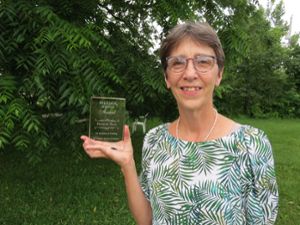MSU's Frances Trail lands two prestigious honors in her field
Michigan State University plant biologist Frances Trail is the recipient of two prestigious honors in her field of study—mycology. Trail was recently named a Fellow of the American Phytopathological Society (APS) and was awarded the 2021 Mycological Society of America (MSA) Weston Award for Excellence in Teaching.

The APS awards the designation of Fellow to a current member in recognition of distinguished contributions to plant pathology or to the APS. Recognition is based on significant contributions in one or more of the following areas: original research, teaching, administration, professional and public service, and/or extension and outreach. Trail received the honor based on her outstanding and innovative research in the biology of plant pathogenic fungi. Her work was vital to establishing the grain pathogen Fusarium graminearum as model fungus species to study pathogenicity and sporulation. F. graminearum causes the head scab of wheat, the most devastating disease of the world’s most important food crop.
In addition, Trail was recognized by the MSA with the William H. Weston Award for Excellence in Teaching, which is awarded annually to an outstanding teacher of mycology at the undergraduate and graduate levels. The Distinctions Committee "was impressed with every part of your nominating package but we were particularly struck by the stories your students tell of your warmth and presence in the classroom."
Trail, professor and associate chair in the Department of Plant Biology in the College of Natural Science, studies development in filamentous fungi and host-pathogen interactions using genetics, genomics and physiological approaches.
“Recognition of my work by APS, in which I have been a member of for more than 30 years, is a great honor.” Trail said. “To also be recognized by MSA is gratifying. I appreciate the recognition, but the high school, undergraduate, graduate and postdoctoral students who have contributed to my lab have done the work, and I’m incredibly grateful to them.”
_300x215.jpg)
Fungi impact all areas of our lives: they provide food (mushrooms, soy sauce); eat us (athletes foot); kill us (Cryptoccus neoformans); poison us (Fusarium graminearum); and cure us (penicillin). The Trail lab researches Fusarium graminearum, a fungus that produces toxins that contaminate our wheat, barley and corn and the subsequent health problems it causes.
“Frances is a leader in understanding complex interactions between plants and fungi, and how these interactions can result in some of the most devastating diseases that impact crop productivity and food safety,” said Jiming Jiang, MSU Foundation Professor and interim chair of the Department of Plant Biology. “Her work has not only impacted studies of plant-pathogen interactions, but they also are being applied to understand fungal diseases in humans. I’m delighted that the APS has recognized her pioneering research and MSA has recognized her contributions to teaching and outreach with their highest honorary awards.”
APS is a diverse global community of scientists in nearly 100 countries whose mission is to discover and disseminate new knowledge of plant systems worldwide to meet humanity’s need for safe and nutritious food, affordable fiber, sustainable forests, and verdant landscapes; and promote the development and adoption of economically and environmentally sustainable practices to ensure plant health.
The MSA is an international organization that is home to mycologues, mycophiles, fungal biologists, and all persons with a personal or professional interest in fungi. The MSA has members from more than 40 countries, who come from academic, industrial, medical, governmental, and amateur backgrounds.
Trail was officially recognized at the APS Plant Health 2021 Online conference the week of August 1 during its award ceremony. A reception for awardees took place at the annual MSA meeting the week of August 8th.
For additional information about APS, see www.apsnet.org, and for MSA, see www.msafungi.org.
Banner image: Spore shapes have evolved to function in a specific niche. Photo: Christina de Miguel